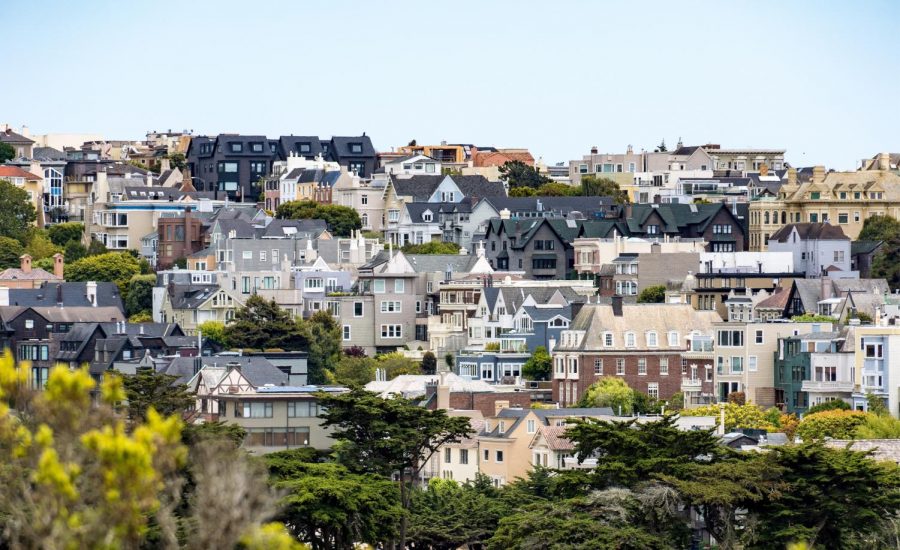OPINION: San Francisco’s $15 Minimum Wage Won’t Help the Housing Crisis
July 14, 2018
Over the years, San Francisco has accumulated a variety of nicknames: “The City by the Bay,” “The Golden City,” and now, “The City for the Rich.”
The San Francisco Bay Area’s housing crisis has spiraled, pushing low-income earners and many other long-time residents out of the city due to high rent. Although the minimum wage has increased from $14 to $15 an hour as of July 1, more needs to be done in order for people to be able to live comfortably while earning a minimum wage.
Interviews with people in San Francisco for the Fourth of July holiday, which usually brings about feelings of national pride and security, revealed anxiety, sadness, and bitterness about how the city’s housing picture is changing.
“I used to live in San Francisco on minimum wage years ago, and you could do it then, but I feel like you can’t do it now,” Joanna Robinson, a Hollywood writer for Vanity Fair, said. “It’s the Silicon Valley influx, the tech culture has created demand for housing and the market has just risen to meet it, and I understand that that’s just economics but it’s done damage to our communities in San Francisco.”
The average monthly rent for a one-bedroom apartment has risen by over $1,000 over the past seven years, and a family of four earning $117,400 a year is now considered low-income in the Bay Area.
The math of the minimum wage isn’t attractive. If a person works a 40-hour work week, his or her monthly income would come to $2,024 after federal taxes. With the cost of living, excluding rent, in San Francisco totaling $1210.51, only $813.49 remains to cover rent in a city where the average price of a one-bedroom apartment is $3441 per month. This often leaves residents with no other option than to move out of the city, or share an apartment with as many as five other roommates.
Assuming a person would pay ⅓ of a monthly income of $2,024 for housing, that income would allow them to live in Lubbock, Texas, as well as Wichita, KS and Lincoln, NE. Despite that, people should be able to have a choice in where they live, without feeling like they have to leave their heart in a city that they can’t afford to live in.
“I have friends who live in co-ops, that’s just how they make ends meet,” UC Santa Cruz graduate Daniele Lim ’12 said. “They’re gonna be 30 soon and they can’t afford a place of their own, that’s just what it’s like to live here. There’s a reason I live in Albany and not San Francisco.”
However, the problem is much more complex than a higher minimum wage. With rent prices rising as quickly as they are, the minimum wage would have to be constantly changing in order to keep up. Simply put, it’s not enough to raise the minimum wage. Much more affordable and high-density housing needs to be built at a faster rate in order to accommodate the level of growth in the city.
“We need housing for everybody here, and ultimately, if housing weren’t so scarce here, my landlord wouldn’t be able to charge $4000 a month for rent,” software engineer Robert Fruchtman said.
It won’t be long until San Francisco, known for its diverse population and cultural movements, loses the population that makes it so special. Only by building more affordable housing can we prevent this melting pot of a city from becoming a place where only the rich can live.




Daniel Chen • Aug 25, 2018 at 8:03 pm
Your article is extremely well written and definitely has a very professional feel to it. However, there are some fundamentally flawed and shallow arguments in your opinion piece.
I agree with you that there is an enormous housing crises in San Francisco and that people are having to move out, which is indeed very sad. Nobody likes the thought of large amounts of people not being able to afford a home. But I must disagree with several of your points.
First of all, you ran some calculations and suggested that a minimum wage is not enough money to live in San Francisco. While that is true, it ignores the point of a minimum wage. The minimum wage is not meant for people to make a living on. When we think of low-wage/minimum-wage earners, we tend to think of large families working tirelessly on end to get by and feed themselves. But reality is different. According to the Bureau of Labor Statistics, more than half of all minimum wage earners are ages 16-24, so they’re most likely high school/college kids earning pocket money. Minimum wage was never meant for people to live comfortable lives and support families with. Rather, minimum wage jobs are a stepping stone to better, higher paying occupations. They aren’t some kind of dead end. People use minimum wage jobs to open doors, to seek out better opportunities.
You also forgot to mention the countless negative impacts that raising the minimum wage would create. At face value, raising the minimum wage seems like a good idea, people will get paid more and everyone is jolly happy. But the money isn’t coming out of thin air. When you raise the minimum wage, companies have to pay their employees more and they have less money. When companies have less money, they fire people. So raising the minimum wage will result in a huge loss of jobs. Not only that, but a lot of companies will increase the price of their products, artificially inflating the economy, and deflating our currency.
Second, you mentioned that “people should be able to have a choice in where they live, without feeling like they have to leave their heart in a city that they can’t afford to live in.”, quoted Robert Fruchtman saying “we need housing for everybody here”, and said we need to “prevent this melting pot of a city from becoming a place where only the rich can live”. But that just isn’t how the real world works. It’s not anybody’s responsibility to ensure that everyone can live in a certain area nor is it anyone’s right to be able to live where they want. If an area or city is too expensive, people move out. That’s natural for all kinds of places. People move around all the time. Of course, I want people to be able to live where they want. But sometimes, it’s just not feasible. Many people would prefer to live on the 5th street of New York City, but it’s just not possible for all of them to live there. However, there is another side to this. When the low-income earners start moving out, what happens? People want them back. So guess what? They start voluntarily paying higher wages to attract workers back to San Francisco. The free market is useful in this way.
Third, the article completely neglects how we can fix the housing crisis. You talked about creating more “affordable and high-density housing”, but you never mention how we’re going to do it and who is going to pay for it. If only the world’s homelessness problem were as simple as “build more affordable housing”. The situation is much more nuanced. There are a variety of factors contributing to the high housing prices in San Francisco. First being something you briefly quoted, the “Silicon Valley influx” bringing in large amounts of high-wage earners. When lots of people move into an area, housing prices go up because of increased demand as well as a willingness on the part of these tech workers to pay high housing prices. But that shouldn’t be seen as a burden on the San Francisco community. Any other city would be happy to welcome the influx of jobs, workers, and income. The tech invasion is not the main culprit, and they boost the San Francisco economy. The tech workers reinvest into local businesses. “A rising tide lifts all boats”.
The problem is being caused mostly by the local and state laws in the area. In almost every state in the United States, the amount of property tax you pay is about 1% of how much your house is *currently* worth. So generally, your property tax will increase every year along with the price of your house. But under California’s Proposition 13, your property tax is calculated as a percent of the price at which you *bought* the house. Meaning, your house could’ve multiplied a gajillion times in value, but your property tax will not change from its original value. So when the tech workers came in and housing prices rose, nobody was willing to move because housing mobility was stifled by Proposition 13. If you left your house and bought a new one, your property tax would be so much higher. Thus, supply was low but demand was high, which skyrocketed housing prices. But wait, there’s more! San Francisco zoning laws dictate that “in order to preserve their iconic views”, you cannot build houses taller than 40 feet in most areas. So no one can build up! No wonder there’s no space left! Much of San Francisco still consists of short little buildings, which can’t fit many people but take up a lot of room, exacerbating the housing crisis. Because of all this, San Francisco has one of the biggest housing problems in the US.
The solution is not as easy as “we need more affordable housing”. Your argument not only fails to address how we will pay for the housing, but it makes a mockery of the real issue at hand. We both know raising the minimum wage won’t solve the housing crisis, but the idea of building more affordable housing won’t either, as that only treats the symptoms and not the root cause. In order to help people stay in the beautiful city of San Francisco, the laws on the books must be changed to support growth, construction of taller buildings, and housing mobility.
Again, your article is very professional and polished, but I hope my critiques can shed some more light on this deep, nuanced issue. Any response is welcome.
DigitalPrinting • Jul 18, 2018 at 12:10 am
Thanks a lot for the post.Really thank you! Much obliged.